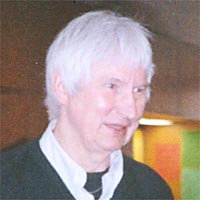Workshop on QUANTUM MEASUREMENTS AND OPERATIONS FOR CRIPTOGRAPHY AND INFORMATION PROCESSING
Quantum Measurements and Operations for Criptography and Information Processing
Infinite Divisibility and Associated Processes
>VITAE:
Ole E. Barndorff-Nielsen is professor at the Department of Mathematical
Sciences, University of Aarhus. Sc.D. University of Copenhagen. Member
of the Royal Danish Academy of Sciences and Letters. Member of Academia
Europaea. Corresponding Member of the Royal Society of Edinburgh. President
of the Bernoulli Society (1993-1995). Chairman of ERCOM (European Research
Centres on Mathematics) under EMS (European Mathematical Society) (1997-2002).
Scientific Director of “MaPhySto” (Centre for Mathematical
Physics and Stochastics) (1998-2003). Humboldt Research Award 2001.

This talk considers random objects that are infinitely divisible in the sense of being representable as `sums' of other `independent' random objects, where the terms in the decomposition are mutually similar and the number of terms can be arbitrarily large. Based on concepts of this type one may build a multitude of processes.The most well known such concept is that of infinite divisibility in classical probability, with the associated Levy processes. The study of this was founded by Kolmogorov, Levy and Khintchine during the second quarter of the 20th Century and has since grown into an enormously rich theory of great theoretical and applied interest. The concept of infinitely divisible quantum instruments is closely related to this. Recently, in the context of quantum stochastics, several other types of infinite divisibility have arisen: "free, monotone; anti-monotone; boolean". Most developed at present is free infinite divisibility which has its origin in the study of C* algebras and the theory of large random matrices. The talk will survey the area in not too technical terms.